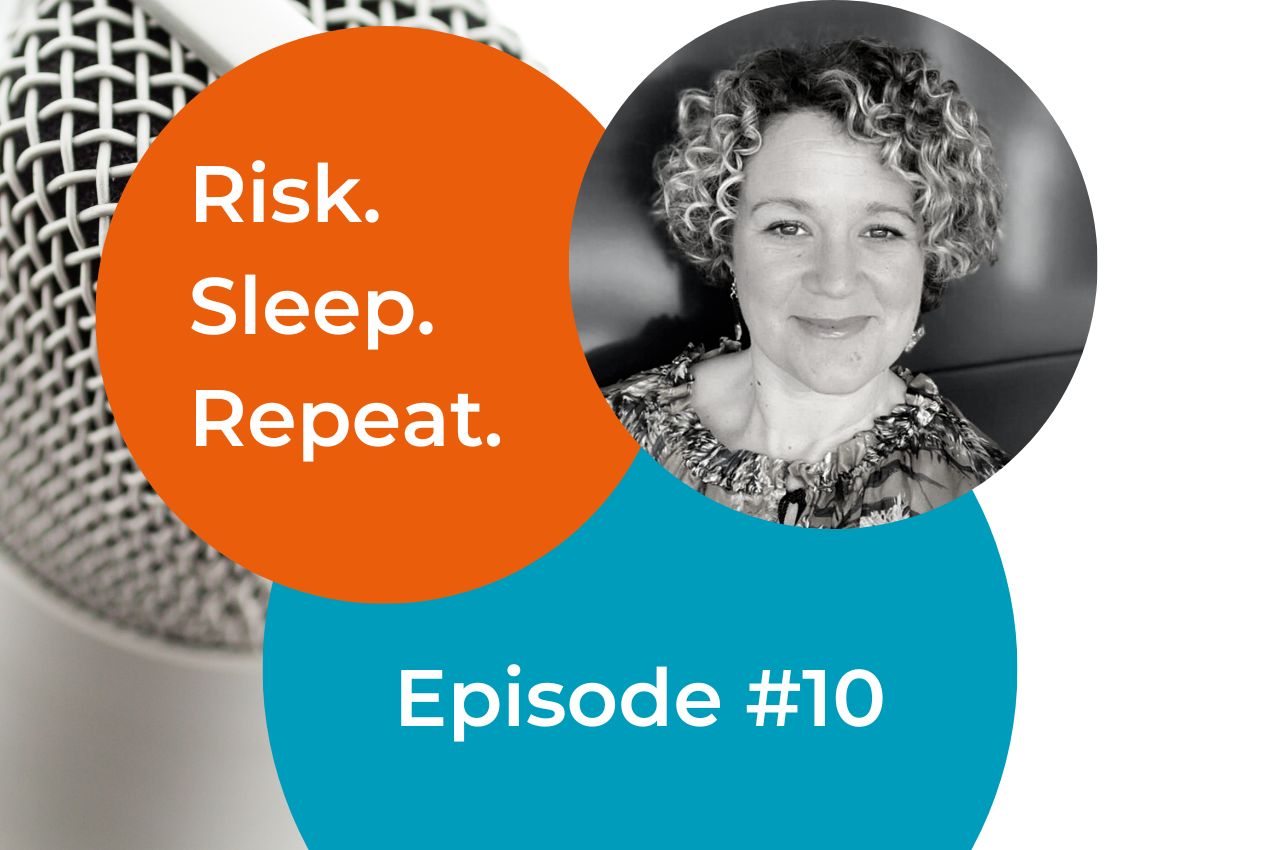
In this episode we are joined by Louise Harry, who leads Siemens Environmental Protection, Health Management and Occupational Safety in the UK and Ireland. With a passion for employee engagement, digitalisation and manufacturing, Louise has worked globally in EHS roles in manufacturing, IT & telecommunications sectors before joining Siemens in 2018.
This conversation looks at entering the environmental, health and safety profession, the importance of building good relationships in the workplace and making unpopular decisions.
Here is a snippet of the conversation between Louise and Mike:
Q1. How did you end up being in your position as a leader in Occupational Health Safety environment?
I was at EHS World Congress two weeks ago, and a new colleague that I met there described me as a purist, which is an interesting term, isn’t it. I studied environmental health at university and have worked for my whole career in environmental protection, health management and occupational safety. So, it was quite an interesting conversation to be described as a purist, because I hadn’t considered myself a purist at all, you know.
I’ve always been curious and have worked in various support functions of businesses. I have a BSc in environmental health, which was a great grounding for moving into the workplace, because it was fairly practical. I was studying at a time when the six pack regulations were coming out of Europe – the launch of risk assessments. I was able to learn at a very theoretical stage at university about these wonderful new set of regulations that were about to appear in the workplace, and study those alongside things like environmental economics, but also landfill management, pollution control and lots of other good basics.
While I was studying, I had the opportunity to undertake a placement with Motorola at one of their manufacturing facilities, which was in Swindon. One of the projects that I undertook for them was to write the risk assessments for the whole factory. They had a capable EHS manager; he was very experienced, but the concept of risk assessments was new. So, I went in for four months over a summer period, and it was my job to look at everything within the factory and write the risk assessments. It was the most incredible baptism into the workplace; the difference of theoretical safety, what you think it means on a piece of paper and what it’s like to manage safety and talk to people who are doing those jobs and undertaking those tasks was fabulous.
I then went straight from university into Motorola on their graduate scheme as an EHS engineer and spent six years with Motorola working in various industries. This was at a time when Motorola was a huge, global multinational conglomerate of a lot of different types of industries. It was a wonderful opportunity of not just going and working in one type of business but having a very multifaceted early education of what EHS meant across a very wide range of practices. A semiconductor fab is very chemically intensive, so the occupational hygiene and health concerns are a big priority. Then with cellular infrastructure, there was a lot of construction there, and because of the global nature of the business I worked in the Asia, Pacific, Europe, Middle East Africa and the Americas region. Again, I was able to understand at an early stage, how different EHS practice can be across different types of cultures as well.
Following Motorola, I had this lovely time in my 20s of travelling the world and living in different places for a few months at a time. I then reached a point in my life where I wanted to be more UK centric, so went to work for T Mobile which eventually became EE as a merger of merger of T Mobile and Orange, and then spent about 15 years with that business in its various forms. At times I had specialist environmental roles or specialist safety roles, and then ended with a wide ranging EHS role. That was a wonderful opportunity to go back to basics with EHS and say, between these two businesses, we have 150 processes and procedures, what do we need for this business going forward? It was a very liberating – now is the time if we want to, to rip up and start again.
Then four years ago, Siemens came to talk to me about taking on the EHS director role for the UK. I have to tell you, I think it’s because of that first summer of writing risk assessments in a manufacturing facility, I do have a bit of a soft spot and a passion for manufacturing. I just enjoy those sorts of environments, and actually the opportunity to perhaps come back into actually what’s a very forward-thinking technology company on one hand, but it has this wonderful 175-year legacy of manufacturing and engineering just felt like a great combination for me. That’s been a very happy for years to date, as well.
Q2. For those looking at similar degrees or who want to come into a similar profession, what does it mean and what does it look like?
This year, we have two interns in my department. One who focuses on health and wellbeing, and another who focuses on environmental protection and sustainability. We’re very fortunate in EHS that we have people who become practitioners, perhaps out of operational roles within businesses, and they bring that wonderful wealth of experience. However, I am also very conscious we must build our talent pipeline for the future as leaders. If we think about safety, it doesn’t have the best reputation, a lot of people it gets a bad press. So being able to go out to universities and foster and sponsor some of interns so they can come into the workplace and experience EHS, I think is a great thing for us to do.
I think it’s about people also understanding, whichever point they choose to come into the profession it doesn’t mean you have to stay within it. You learn so many great skills, and I think that’s really accelerating, the type of skills that EHS practitioners need that place you very well to move on to do whatever you want to do in the future. We always have to maintain that expert technical competence in EHS matters to take on board and implement.
We are increasingly focused on non-cognitive skills, those skills of the future that EHS practitioners need in their ability to influence and take the business on a journey with them. I guess their ability to be an enabling factor as EHS professionals, as opposed to one that is computer says no. For me, as a leader within our business, that’s probably one of my key missions is to really build upon what we achieved during the pandemic. The value that EHS provided into the business and ensuring that you must sometimes not put rules and regulations aside but have them in the right context that allows you to perhaps challenge conventional practice. Then the return that you get in terms of creativity and efficiency and effectiveness, can really bring that significant value back to the bottom line of a business.
Q3. You’ve obviously got a business sense – at what point did this become part of your skill set?
I really began to feel the difference in the shift probably about 10 years ago, and that was partly down to working on some Best Place to Work initiatives in the wider business. There was a real desire to deliver a good employee engagement within that business, so it was a huge project to take on board. As the Head of EHS I was assigned a few of the work factors. I would say since then I’ve really begun to understand that my success is probably defined by understanding. There is a real imperative for both stakeholder engagement but also meaningful engagement. That’s not just those stakeholders, that’s very much focusing on your employees and making sure we have that strong engagement.
If you have people engaged with you and your journey to deliver world class safety or EHS management and become a function, that’s not disruptive. It’s just really empowering that when you begin to understand, I can make a difference. I’m not just here, to protect the business from legal problems or requirements, I can make a difference.
I’d say in the last few years, it’s about going even further and thinking about how our topics and professions change again, and we start to focus very much on holistic wellbeing and psychosocial risk management. It’s a piece of me, and I say this to my team all the time. We can enrich our people – why can’t we send them home a little bit better each day than when they came to work? We’re purpose led people – lets deliver some of these great topics back in, focus on the fact that all our employees and our stakeholders are unique individuals with things going on in their life. We don’t have to just focus on a piece of machinery – we can very much focus on what we can do to make your workplace, your life and time at work enriching for you.
Q4. For those practitioners that are maybe not at that stage yet, is there any sort of advice you would give to those who feel like they are on the outside looking in?
I would say the first piece of advice is very much about creating those great working relationships within your business that you’re working in. Learning very clearly that if you feel you are on the outside, that’s maybe because there’s a little bit of silo working going on, so you must break that. That’s always the first thing is to go out and build those great relationships with all those other departments within your business. There’s a very natural link into human resources or people in organisation. There’s always a very natural affinity between EHS and that group of people to build good bonds and cross functional working.
Another key area is supply chain management; so many of our colleagues within supply chain or procurement have a very future focused attitude around sustainability and long-term environment protection. I would say it’s about identifying those departments where there is some affinity and building those relationships and credibility with those people.
If you’re going to do things and deliver, make sure you actually deliver on what you think you can. Then once you’ve built some of those, then you start to cast your net a little wider in the business. You go and talk to your finance departments and your operations departments. I guess the key mantra is about being that enabling partner to the business, not being a disruptive partner to the business. We’ll often see things as EHS practitioners that don’t feel right. We know we have to amend the practice, but rather than stomping in saying you’ve got to stop that, it’s always nice to start with a question or a statement. I think I can help you do that better, and that’s never poorly received by anybody in the business.
I think if you feel like you’re not quite in there, it’s that sense of go in and offer, bring to the table what you know you can offer to them. Sometimes people can be a little protectionist about their areas, but I think if you go in with a genuine, authentic sense of I am here to enable you to help run this business in a more successful way, it will always be gratefully received.
